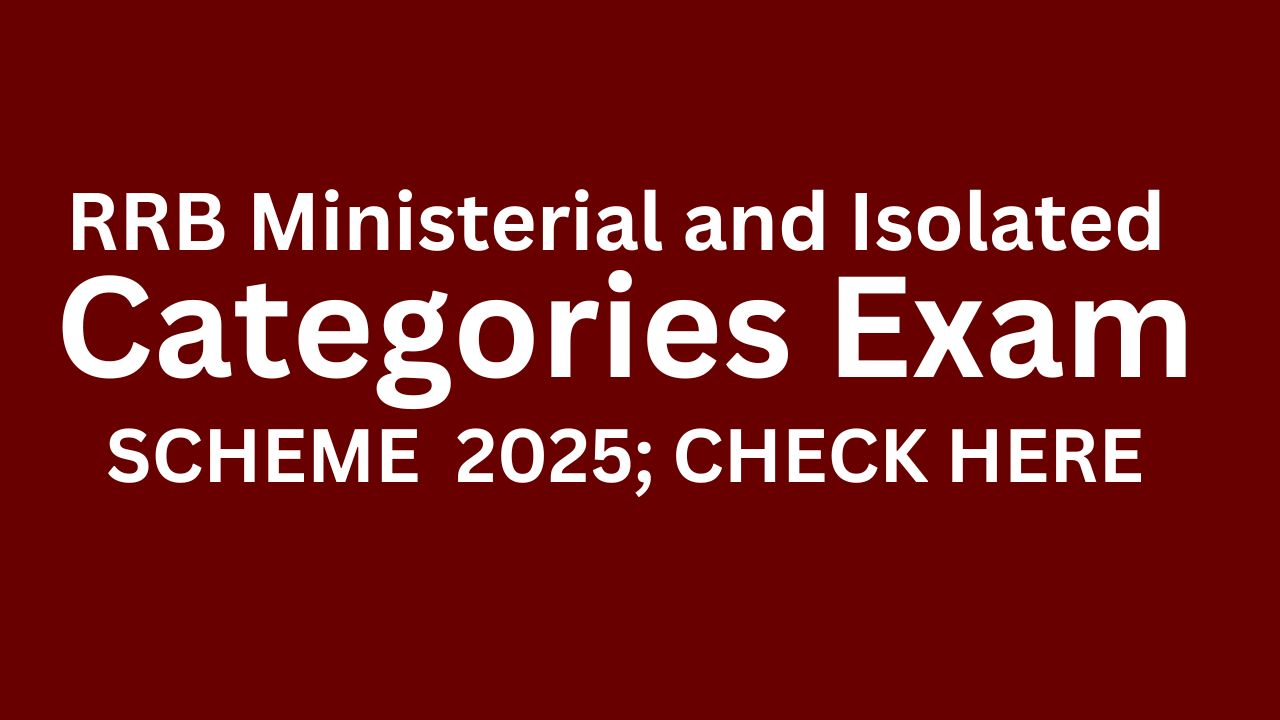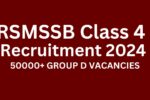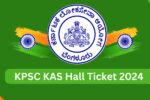RRB Ministerial and Isolated Categories Exam Scheme 2025: The Railway Recruitment Board (RRB) conducts the Ministerial and Isolated Categories Exam, an important recruitment examination for various posts under Indian Railways. This exam is part of the recruitment process for positions like Junior Stenographers, Junior Translators, Chief Law Assistant, and other ministerial and isolated roles.
The exam consists of a Computer-Based Test (CBT) with 100 multiple-choice questions (MCQs), totaling 100 marks. The syllabus for this exam is diverse and includes several subjects such as professional ability, general awareness, general intelligence, reasoning, mathematics, and general science.
This article provides an in-depth look at the RRB Ministerial and Isolated Categories Exam Syllabus, covering the exam pattern, structure, key sections, and essential topics that candidates need to focus on. Let’s dive into the details of this exam to help you prepare thoroughly.
RRB Ministerial and Isolated Categories Exam Scheme 2025
The RRB Ministerial and Isolated Categories Exam follows a structured approach, with a well-defined syllabus and marking scheme. Here is an overview of the exam scheme:

| Exam Conducting Body | Railway Recruitment Board (RRB) |
|---|---|
| Exam Name | Ministerial and Isolated Posts |
| Total Questions | 100 |
| Total Marks | 100 |
| Negative Marking | 1/3 marks deducted for each wrong answer |
| Duration | 90 Minutes |
| Official Website | indianrailways.gov.in |
RRB Ministerial and Isolated Categories Exam Structure
The RRB Ministerial and Isolated Categories exam is primarily a Computer-Based Test (CBT) that consists of multiple-choice questions. Each section is designed to test the candidate’s proficiency in different subjects. Below is the breakdown of the exam structure:
| Section | Questions | Marks |
|---|---|---|
| Professional Ability | 50 | 50 |
| General Awareness | 15 | 15 |
| General Intelligence | 15 | 15 |
| Mathematics | 10 | 10 |
| General Science | 10 | 10 |
| Total | 100 | 100 |
Each section is equally important, and candidates must focus on all areas to perform well in the exam.
Indian Railway Ministerial and Isolated Categories Exam Syllabus
The Indian Railway Ministerial and Isolated Categories Exam syllabus is comprehensive and covers several core subjects. Here are the key sections that candidates should prepare for:
1. General Awareness
The General Awareness section assesses candidates’ knowledge of various topics, including current events, history, geography, economics, and science. Important areas to focus on include:
- National and International Current Affairs: Key events, leaders, and government schemes.
- History: Ancient, medieval, and modern history of India, including the freedom struggle and post-independence developments.
- Geography: India’s physical features, world geography, and important geographical terms.
- Economics: Basic economic principles, Indian economy, budget, and five-year plans.
- General Science: Physics, chemistry, biology, and environmental studies.
- Constitution of India and Polity: Structure of the Indian government, fundamental rights, and duties, and major political systems.
- Panchayati Raj: Local governance and public administration.
2. General Intelligence and Reasoning
The General Intelligence and Reasoning section evaluates a candidate’s logical reasoning and analytical skills. Key topics in this section include:
- Analogies and Relationships: Identifying patterns and relationships between different concepts.
- Coding-Decoding: Deciphering the coded messages.
- Series: Number series, alphabetical series, and alphanumeric series.
- Venn Diagrams: Problem-solving using Venn diagrams.
- Syllogisms and Jumbling: Deductive reasoning and identifying the order in jumbled sequences.
- Data Interpretation: Analyzing and interpreting data presented in the form of graphs, tables, and charts.
- Decision Making: Logical reasoning to make decisions based on given scenarios.
3. Mathematics
The Mathematics section evaluates candidates on basic mathematical concepts. Key topics include:
- Number System: Whole numbers, integers, and real numbers.
- BODMAS: Operations involving brackets, orders, division, multiplication, addition, and subtraction.
- Fractions and Decimals: Basic operations with fractions and decimals.
- LCM and HCF: Least Common Multiple and Highest Common Factor.
- Ratios and Percentages: Proportions, percentages, and their applications.
- Mensuration: Perimeter, area, and volume of basic geometrical figures.
- Time and Work: Work efficiency, time calculations, and work-related problems.
- Time and Distance: Speed, distance, and time-related problems.
- Simple and Compound Interest: Concepts and calculations of interest.
- Profit and Loss: Calculations involving profit, loss, and discount.
4. General Science
This section assesses a candidate’s knowledge of fundamental science. Topics include:
- Physics: Basic principles of motion, force, energy, heat, and light.
- Chemistry: Atomic structure, periodic table, acids, bases, and salts.
- Biology: Human body, cells, diseases, and environmental issues.
- Environmental Science: Climate change, conservation, pollution, and ecological balance.
Stenography Skill Test
For candidates applying for stenographer roles, a Stenography Skill Test is conducted. This test focuses on:
Typing Speed: Candidates must transcribe the dictated words accurately and quickly.
- English Typing: 80 words per minute (WPM) with 50 minutes for transcription.
- Hindi Typing: 80 words per minute (WPM) with 65 minutes for transcription.
Spelling Accuracy and Editing: The test also evaluates spelling accuracy and the ability to edit text in various fonts like KrutiDev or Mangal.
Penalty: Significant errors incur a one-mark deduction, while minor errors incur a half-mark penalty.
Translation Test
This test is specific to candidates applying for the Junior Hindi Translator position. The translation test evaluates the candidate’s ability to translate text from one language to another. Though it does not contribute to the final score, candidates must score at least 60% to qualify for further stages.
Teacher Performance and Skill Test
Candidates applying for teacher posts (TGT, PGT, PTI, PRT) must undergo a Teacher Performance and Skill Test. This includes:
- Demonstration of Teaching Methods: Candidates will be given topics to demonstrate their teaching methods.
- Evaluation of Artistic Skills: Music and dance teachers will be evaluated on their artistic abilities and execution.
Conclusion
The RRB Ministerial and Isolated Categories Exam is a comprehensive test designed to assess candidates’ skills across various domains, including professional ability, general awareness, reasoning, mathematics, and science. Preparing well for each section is crucial for success in this competitive exam. Candidates must focus on the key topics mentioned in the syllabus and practice extensively to improve their chances of selection.
Make sure to follow the official website indianrailways.gov.in for the latest updates and notifications related to the exam. Good luck with your preparation!



